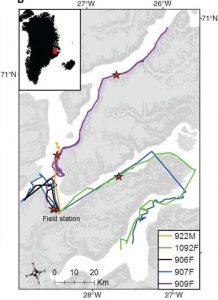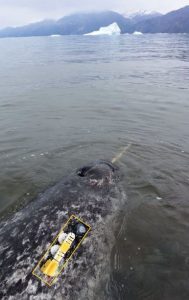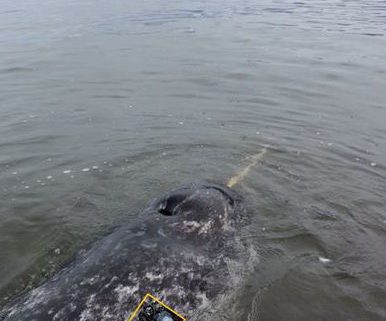Narwhals Display Perplexing Escape Responses to Human-Induced Stress
By Olivia Schuitema, SRC intern
Narwhals (Monodon monoceros) are Arctic marine mammals that have traditionally been relatively isolated from anthropogenic contact, making them particularly vulnerable to disturbance (Williams, 2017). The lack of ecological interference also makes narwhals adequate study organisms regarding anthropogenic effects. With larger declines in Arctic sea ice, narwhals have been increasingly exposed to predation, human hunting and seismic exploration (Williams, 2017). For example, seismic surveys in the Arctic aim to pinpoint fossil fuel reserves and in the process release high-energy noise that can affect marine mammal migration and behavior (Jørgensen, 2013). Scientists aimed to gauge the stress responses of release after entanglement or stranding by monitoring the behavior and the cardiovascular and energetic responses of narwhals inhabiting East Greenland (Williams, 2017).

Figure 1: Study area in eastern Greenland with GPS tracks for five instrumented narwhals, Williams, 2017
When exposed to stressful conditions, animals tend to respond in one of two ways: 1) “fight or flight” reaction; stay to fight the threat or flee from the threat, or 2) freeze reaction; extreme decrease in heart rate. Mammals who flee their situation show signs of tachycardia (elevated heart rate) and increased rates of respiration (Williams, 2017). Conversely, mammals that “freeze” tend to show signs of bradycardia (slowed heart rate) and slowed behavior. These two escape systems stem back to two different anatomical positions in the mammalian brain, making fleeing and freezing simultaneously very unlikely.
Scientists placed electrocardiograph-accelerometer-depth monitors on five narwhals immediately released from entanglement and stranding (Williams, 2017). These devices were attached via suction cup for varying amounts of time (0.4-3 days) and measured heart rate, speed, and depth of the escaping narwhals. The studied organisms showed a paradoxical response upon release; a fleeing response with high stroke frequencies immediately followed by heightened bradycardia (“cardiac freeze”), a freezing response (Williams, 2017). Data also showed that the longer it took to release the entangled narwhals, the more likely they were to undergo cardiac freeze (Williams, 2017). These results show the negative effects of human-induced stress, but also highlight the inconsistencies of marine mammal responses to such stress.

Figure 2: Narwhal with ECG-ACC recorder (Electrocardiograph-accelerometer-depth monitor) on dorsal side of the body, Williams, 2017
The profound melting of sea ice due to climate change has opened up the Arctic to a variety of stressors including human influence. Arctic predators such as killer whales have increased access to Arctic prey items like narwhals (Breed, 2017). More research must be conducted in order to further explore the effects of anthropogenic stress on marine mammals like the narwhal in the Arctic. This example showcases the connection between rise in global temperature and melting sea ice due to climate change. “Climate change” can be a broad and sometimes obscure topic, but as seen by the paradoxical narwhal escape responses, the effects of this phenomena can extend to very specific organisms.
Works Cited
Breed, G., Matthews, C., Marcoux, M., Higdon, J., Leblanc, B., Petersen, S., . . . Ferguson, S. (2017). Sustained disruption of narwhal habitat use and behavior in the presence of Arctic killer whales. Proceedings of the National Academy of Sciences of the United States of America, 114(10), 2628-2633.
Heide-Jørgensen, Hansen, Westdal, Reeves, & Mosbech. (2013). Narwhals and seismic exploration: Is seismic noise increasing the risk of ice entrapments? Biological Conservation, 158, 50-54.
Williams, Terrie M., Blackwell, Susanna B., Richter, Beau, Sinding, Mikkel-Holger S., & Heide-Jorgensen, Mads Peter. (2017). Paradoxical escape responses by narwhals (Monodon monoceros). Science, 358(6368), 1328.




Leave a Reply
Want to join the discussion?Feel free to contribute!